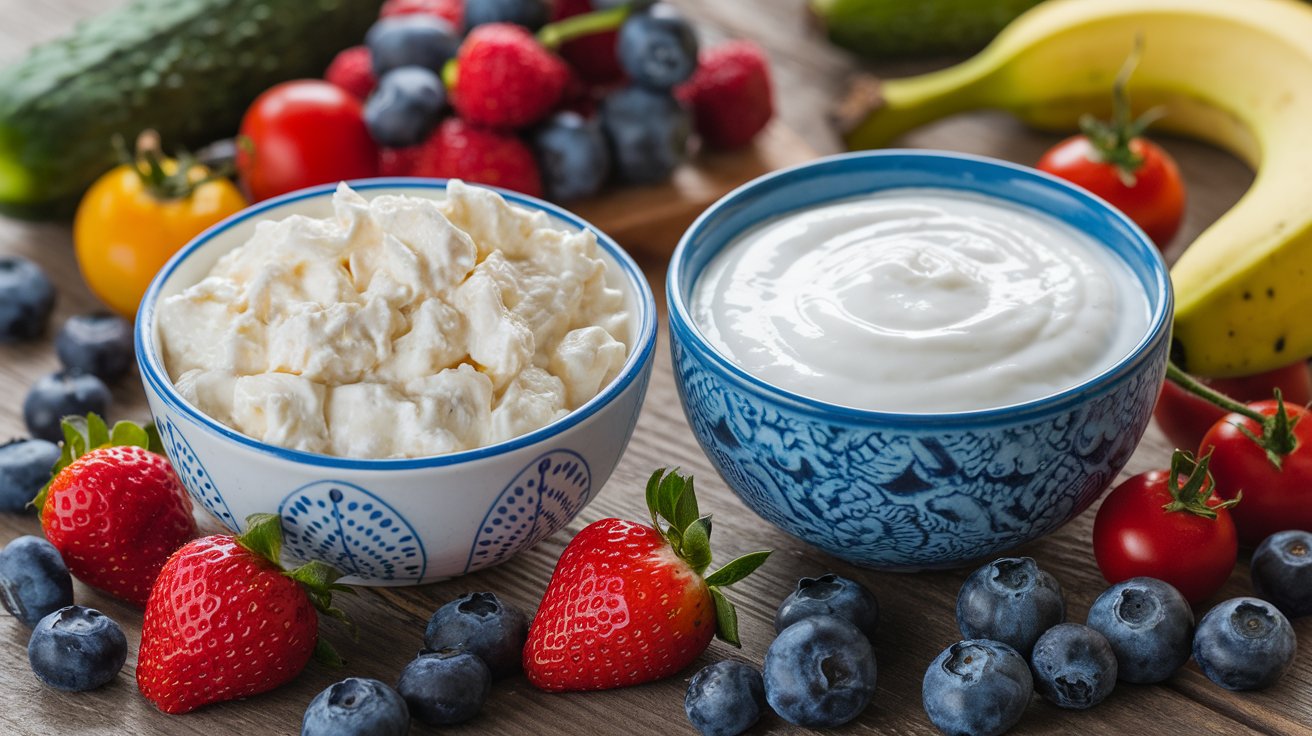Cottage cheese and yogurt are two of the most popular dairy products worldwide, celebrated for their versatility, health benefits, and rich nutritional profiles. Whether you’re looking for a quick snack, a protein-packed breakfast, or an ingredient for cooking, both options are excellent choices. However, they differ significantly in terms of texture, taste, and nutritional content, which might make one better suited to your specific needs.
In this article, we’ll compare cottage cheese and yogurt across several dimensions, including nutrition, health benefits, and their uses in the kitchen. By the end, you’ll know exactly when to choose cottage cheese over yogurt (and vice versa) based on your dietary goals and culinary needs.
Table of contents
Understanding the Basics
What is Cottage Cheese?
Cottage cheese is a fresh, soft cheese made by curdling milk and separating the curds from the whey. The curds are then rinsed and lightly salted, resulting in its signature lumpy texture and mild, slightly tangy flavor. Unlike aged cheeses, cottage cheese is not fermented or matured, giving it a fresh, creamy taste.
This versatile dairy product is available in various fat levels, including full-fat, low-fat, and fat-free versions. It’s also widely used in both savory and sweet dishes, making it a staple ingredient in many diets. Additionally, cottage cheese is rich in protein and low in carbohydrates, making it an excellent choice for high-protein, low-carb, and keto diets.
What is Yogurt?
Yogurt is a fermented dairy product made by adding live bacterial cultures to milk. These bacteria, usually Lactobacillus and Streptococcus, ferment the lactose in milk into lactic acid, creating yogurt’s creamy texture and tangy flavor. There are several types of yogurt, with the most popular being regular yogurt, Greek yogurt, and Skyr (Icelandic yogurt).
Greek yogurt, for example, is strained to remove whey, resulting in a thicker texture and higher protein content. Regular yogurt is less dense but offers a lighter, creamier consistency. Yogurt is available in plain, flavored, and fruit-infused varieties, catering to a wide range of palates and dietary needs.
What makes yogurt particularly unique is its probiotic content. These beneficial bacteria can support gut health and digestion, making yogurt a staple for those seeking a balanced diet.

Nutritional Differences
Protein Content
When comparing cottage cheese and yogurt, one of the most striking differences is their protein content. Cottage cheese typically provides more protein per serving, making it a popular choice for those on high-protein diets or seeking post-workout recovery foods.
- Cottage Cheese: A single cup of cottage cheese can contain up to 25 grams of protein, depending on the brand and fat level. Its high protein content comes from casein, a slow-digesting protein that helps with muscle repair and provides lasting satiety.
- Yogurt: Regular yogurt provides around 10 grams of protein per cup. Greek yogurt, however, is a worthy competitor to cottage cheese, offering about 20 grams of protein per cup due to its straining process, which concentrates the protein.
In summary, both are excellent protein sources, but cottage cheese edges ahead slightly, especially in its regular form.
Calorie and Fat Content
The calorie and fat content of cottage cheese and yogurt vary depending on the type you choose—full-fat, low-fat, or fat-free.
- Cottage Cheese:
- Full-fat cottage cheese has approximately 200 calories and 9 grams of fat per cup.
- Low-fat versions contain around 160 calories and 2-3 grams of fat, while fat-free options can have as little as 100 calories and no fat.
- Yogurt:
- Full-fat yogurt has about 150-200 calories and 8 grams of fat per cup.
- Low-fat and fat-free yogurts are lighter in calories and fat, often ranging from 80 to 120 calories per cup.
Both are flexible for different dietary needs, but low-fat yogurt generally has fewer calories than low-fat cottage cheese.
Sugar and Carbohydrate Levels
Sugar content is another major difference between cottage cheese and yogurt. Yogurt, particularly flavored varieties, can contain significantly more sugar due to added sweeteners.
- Cottage Cheese: Cottage cheese is naturally low in sugar, with only 3-6 grams of lactose (natural sugar) per cup. It rarely contains added sugar unless flavored.
- Yogurt: Plain yogurt contains about 6-8 grams of natural sugar from lactose, but flavored yogurts can have 15-20 grams of sugar or more, depending on the brand.
For those watching their sugar intake, plain cottage cheese or unsweetened yogurt is the better choice.
Calcium and Other Nutrients
Both cottage cheese and yogurt are excellent sources of calcium, a mineral essential for bone and dental health. However, yogurt tends to provide slightly more calcium per serving:
- Yogurt: A cup of yogurt can deliver 250-300 mg of calcium, which is about 25-30% of the recommended daily intake.
- Cottage Cheese: Cottage cheese offers around 200 mg of calcium per cup, depending on the brand and preparation method.
In addition to calcium, yogurt is typically richer in potassium, supporting heart health and muscle function. Yogurt also boasts probiotics, live bacteria that improve digestion and boost gut health. While some cottage cheese brands include probiotics, they are more common and abundant in yogurt.
Health Benefits
Cottage cheese is a nutritional powerhouse, offering several unique benefits:
- High in Protein:
With up to 25 grams of protein per cup, cottage cheese is perfect for building and repairing muscles. Its slow-digesting casein protein keeps you feeling full for longer, making it a great choice for weight management. - Low in Carbs:
Cottage cheese contains only 3-6 grams of carbohydrates per cup, making it suitable for low-carb and keto diets. - Supports Weight Management:
Its high protein and low-calorie profile make it an excellent option for those trying to shed or maintain weight. It helps reduce cravings while offering lasting energy. - Rich in Calcium:
While slightly lower in calcium compared to yogurt, cottage cheese still provides about 20% of the daily requirement in a single cup. Calcium is vital for maintaining bone density and muscle function. - Versatile in Meals:
Cottage cheese adapts well to a variety of dishes, whether savory or sweet, ensuring that even picky eaters can find ways to enjoy it.
Yogurt Benefits
Yogurt also offers numerous health benefits, especially due to its probiotics:
- Probiotics for Gut Health:
Yogurt is rich in live bacterial cultures that support digestion, strengthen immunity, and promote gut microbiome balance. These benefits are especially pronounced in plain and Greek yogurts. - Higher Calcium Content:
Yogurt generally contains 20-30% more calcium than cottage cheese, making it a better choice for bone and dental health. - Heart Health:
Yogurt is an excellent source of potassium, which helps regulate blood pressure and supports cardiovascular health. - Weight-Friendly:
Greek yogurt, in particular, combines high protein and low calories, making it another good option for weight management. - Lactose Tolerance:
The fermentation process in yogurt reduces its lactose content, making it easier to digest for individuals with mild lactose intolerance.
Cottage cheese is not only a high-protein snack but also an incredibly versatile ingredient in the kitchen. Whether you’re looking for a creamy addition to breakfast, a filling for lunch, or even a dessert component, cottage cheese can deliver. For more creative and delicious ideas, explore 15 Irresistible Cottage Cheese Recipes: From Breakfast to Dessert to see how this ingredient can shine in a variety of dishes.
Which is Better for Specific Diets?
Choosing between cottage cheese and yogurt often depends on your dietary needs:
- For Keto and Low-Carb Diets: Cottage cheese is the better choice due to its lower carbohydrate content.
- For High-Protein Diets: Both cottage cheese and Greek yogurt are excellent options, but cottage cheese edges out slightly due to its higher protein density.
- For Gut Health: Yogurt, particularly those with active probiotics, is superior for digestive health.
- For Bone Health: Yogurt provides higher calcium levels and may be a better choice for supporting strong bones and teeth.
- For Weight Loss: Both are excellent options, but cottage cheese may keep you fuller longer due to its casein protein, while yogurt’s lighter texture can be more appealing for quick snacks.

Uses in Cooking and Recipes
Best Ways to Use Cottage Cheese
Cottage cheese is an incredibly versatile ingredient. Here are some popular ways to incorporate it into your meals:
- Breakfast: Add it to smoothies, use it as a topping for toast with fruit or avocado, or mix it into pancake batter for extra protein.
- Snacks: Use it as a base for dips, pair it with crackers, or enjoy it with sliced fruits.
- Lunch and Dinner: Substitute it for ricotta in lasagna, stuff it into bell peppers, or mix it with pasta for a creamy dish.
- Desserts: Blend cottage cheese to create cheesecake, pudding, or parfaits.
Best Ways to Use Yogurt
Yogurt is equally versatile in both savory and sweet dishes:
- Breakfast: Use yogurt in smoothie bowls, granola parfaits, or as a base for fruit toppings.
- Marinades: Greek yogurt is excellent for marinating meats due to its acidity and creamy texture.
- Sauces and Dressings: Mix yogurt with herbs and spices to create creamy dressings or tzatziki sauce.
- Desserts: Use yogurt to make frozen yogurt, creamy popsicles, or healthy parfaits.
When to Choose Cottage Cheese vs. Yogurt?
Selecting between cottage cheese and yogurt depends on your recipe or dietary goals:
- Choose cottage cheese for savory dishes, thicker textures, or when you need a higher protein, lower-carb option.
- Opt for yogurt in recipes requiring acidity, creaminess, or when probiotics and higher calcium content are a priority.
FAQs
Can you eat cottage cheese or yogurt every day?
Yes, both cottage cheese and yogurt can be eaten daily as part of a balanced diet. Cottage cheese provides high protein with fewer carbs, while yogurt offers probiotics and higher calcium. However, it’s essential to choose plain or minimally processed options to avoid excessive sugar and additives.
Which is better for weight loss?
Both are excellent for weight loss, but the better choice depends on your goals. Cottage cheese, with its higher protein and lower carbohydrate content, keeps you fuller longer. Yogurt, especially Greek yogurt, is also a good option if you prefer something lighter and gut-friendly.
Are flavored yogurts as healthy as plain ones?
Flavored yogurts often contain added sugars, making them less healthy than plain options. To enjoy a sweet flavor without extra sugar, consider adding fresh fruit, honey, or cinnamon to plain yogurt.
Is cottage cheese better for muscle building?
Yes, cottage cheese is ideal for muscle building due to its high protein content and casein, a slow-digesting protein that supports muscle repair and growth. Greek yogurt is another excellent option, though slightly lower in protein.
Can lactose-intolerant individuals eat cottage cheese or yogurt?
Lactose-intolerant individuals can often tolerate yogurt better due to its fermentation process, which lowers lactose levels. However, lactose-free cottage cheese and yogurt options are available for those with severe lactose intolerance.
Conclusion
Cottage cheese and yogurt are both versatile, nutritious dairy products that can fit into a wide variety of diets and recipes. Cottage cheese stands out for its high protein and low carbohydrate content, making it a go-to choice for muscle building, weight management, and savory dishes. Yogurt, on the other hand, shines with its probiotics, higher calcium content, and suitability for gut health.
When choosing between the two, consider your dietary goals and culinary needs. Cottage cheese works well in recipes like lasagna, stuffed peppers, or as a creamy base for dips, while yogurt is perfect for smoothies, dressings, and desserts. Both offer unique benefits and can complement each other in a balanced diet.
Whether you’re looking for a protein-packed meal, a healthy snack, or a tasty dessert, both cottage cheese and yogurt have something to offer. Explore their versatility, experiment with recipes, and enjoy the many health benefits they bring to your table.
Related Article Recipes You Might Like
Ever wondered How They Remove Lactose from Cottage Cheese? If you’re lactose-intolerant but still love dairy, you might also want to explore Lactose-Free Cottage Cheese Options.

